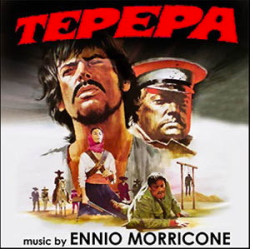主页--->m-comment-000--->mb-comment-005-51
|
电脑版 |
|||||||||||||||||||||||||||||||||||||||||||||
布罗克斯顿评说莫里康内 MB-005-51 |
||||||||||||||||||||||||||||||||||||||||||||||
FA6823 Tepepa / Long Live
the Revolution / 革命万岁 |
||||||||||||||||||||||||||||||||||||||||||||||
作者 乔纳森·布罗克斯顿 (Jonathan Broxton) |
||||||||||||||||||||||||||||||||||||||||||||||
ENNIO MORRICONE 评论,第5部分 005-51 |
||||||||||||||||||||||||||||||||||||||||||||||
 |
||||||||||||||||||||||||||||||||||||||||||||||
TEPEPA (1968年) Tepepa 是一部意大利制作的史诗西部片,以墨西哥革命为背景,由朱利奥·佩特罗尼执导。它讲述了同名革命者耶稣玛丽亚“特佩帕”莫兰(托马斯·米利安饰)的故事,他将被腐败的警察局长卡斯科罗(令人难以置信的是,由奥森·威尔斯饰演)处决。特佩帕出乎意料地被英国医生普莱斯(约翰·斯坦纳饰)救了下来,但不久之后,人们就发现普莱斯只是为了让他可以亲手杀死他,因为他认为特佩帕应对他未婚妻的死负责。在这种死亡和报应的混合体中,还带有涉及革命的政治色彩,以及当地地主的困境,以及试图剥削他们的不道德商人。 主题“革命万岁”是传统墨西哥的精彩作品,但与莫里康内经典中的其他一些西方主题相比,实际上相当传统。它以木管乐器和吉他的缓慢、田园、近乎摇篮曲般的旋律为基础,但随着它的发展变得越来越宏伟和广阔,随着它的成长,它很好地利用了更大的管弦乐力量和更突出的钢琴。“Tepepa e Price”的主题以优美、亲密的长笛旋律评论了两人之间最初积极和兄弟般的关系,但在伴奏吉他的岸边也有轻微的不确定感,这巧妙地提醒听众在电影开始之前普莱斯的口是心非。令人难以置信的是,这个主题的吉他部分让我想起了“Ancora Qui”中的那首,这是莫里康内在 2012 年为昆汀·塔伦蒂诺的《被解救的姜戈》创作的原创歌曲——44 年后! 随着乐谱的发展,其他几首作品因广泛使用西班牙吉他而脱颖而出。“Tradimento Primo”和“A Meta Strada”都有一种美妙的怀旧气息,吉他配以安静的管弦乐队,温暖的弦乐有助于传达Tepepa安静的韧性和对祖国的深厚感情。这继续到“Al Messico Che Vorrei”,这是一首由玛丽亚·克里斯蒂娜·布兰库奇 (Maria Cristina Brancucci)演唱的民歌,她的歌声与明亮、典型的莫里康内小号独奏相得益彰。“Consegna Delle Armi”和“Una Povera Casa”是紧张的编排的悬念线索,传达了 Tepepa 继续为正义而战的紧迫感和决心。专辑的其余部分包括对这些核心主题思想的一系列扩展变化,就像这种类型的莫里康内乐谱一样。 我非常喜欢 Tepepa 的配乐;它没有莫里康内这一时期其他一些西部乐谱的无政府主义或怪异品质,而是一部更加尊重和直截了当的作品,向这位经久不衰的墨西哥民间英雄致敬。优秀的主旋律通常包含在莫里康内西部原声带合辑中,而乐谱本身多年来已多次以黑胶唱片和 CD 形式发行,通常与另一首乐谱配对,通常是 La Resa dei Conti 或 Vamos a Matar Compañeros。这里回顾的这个版本是 GDM/Legend 于 2012 年推出的限量版。 曲目列表: 1. Viva la Revolucion (4:18), 2.Tepepa e Price (0:55), 3.传统普里莫 (2:15), 4.A Metà Strada (1:51), 5.Al Messico Che Vorrei (4:50), 6.乌娜罗莎 (1:44), 7.Consegna Delle Armi (1:17), 8.Una Povera Casa (1:02), 9.Tradimento Secondo (2:52), 10.革命万岁 (5:29), 11.Tepepa e 价格 #2 (0:44), 12.传统普里莫 #2 (1:11), 13.革命万岁 #2 (2:29), 14.Tepepa (Marcetta) (1:58), 15.革命万岁 #3 (3:09), 16.Tepepa (Tema d'Amore) (2:21), 17.Ondas de Amor – 小夜曲 (3:06), 18.乌娜罗莎 #2 (1:31), 19.革命万岁 #4 (5:37), 20.A Metà Strada #2 (1:37), 21.Tepepa (Fragrante Melodia) (1:26), 22.革命万岁 #5 (1:27), 23.传统普里莫 #3 (3:43), 24.革命万岁 #6 (3:13), 25.乌娜罗莎 #3 (1:24), 26.特佩帕(班达)(1:54),27。革命万岁 #7 (3:14), 28.Al Messico Che Vorrei (卡拉OK版) (4:43).GDM/Legend 4220DLX,71 分 20 秒。 |
||||||||||||||||||||||||||||||||||||||||||||||
2020.8.2 |
||||||||||||||||||||||||||||||||||||||||||||||
|
| ||||||||||||||||||||||||||||||||||||||||||||||
以下是原文
| ||||||||||||||||||||||||||||||||||||||||||||||
ENNIO MORRICONE REVIEWS, Part 5-51 |
||||||||||||||||||||||||||||||||||||||||||||||
TEPEPA (1968) Tepepa is an Italian-produced epic Western, set during the Mexican Revolution, directed by Giulio Petroni. It tells the story of the eponymous revolutionary Jesus Maria ‘Tepepa’ Moran (Tomas Milian), who is due to be executed by the corrupt police chief Cascorro (played, incredibly, by Orson Welles). Tepepa is unexpectedly saved by Price (John Steiner), an English doctor, but before long it becomes clear that Price only saved him so that he could kill him himself, as he believes Tepepa was responsible for the death of his fiancée. Added into this mix of death and retribution is a political undertone involving the revolution, and the plight of local landowners, and the unscrupulous businessmen who are attempting to exploit them. The main theme, “Viva La Revolucion,” is a wonderful piece of traditional Mexicana, but is actually quite conventional compared to some of the other western themes in the Morricone canon. It builds from a slow, pastoral, almost lullabyish melody for woodwinds and guitars, but becomes increasingly grand and expansive as it develops, making excellent use of larger orchestral forces and a more prominent piano as it grows. The theme for “Tepepa e Price” comments on the initially positive and fraternal relationship between the pair with a pretty, intimate flute melody, but also has a slight sense of uncertainty underneath it from the banks of accompanying guitars, which cleverly alerts listeners to Price’s duplicity before the movie does. Incredibly, the guitar part of this theme reminds me very much of the one in “Ancora Qui,’ the original song that Morricone wrote for Quentin Tarantino’s Django Unchained in 2012 – 44 years later! As the score develops several other pieces stand out for their extensive use of Spanish guitars. Both “Tradimento Primo” and “A Meta Strada” have a wonderful nostalgic air, guitars backed with quiet orchestrations for warm strings that help convey Tepepa’s quiet resilience and deep affection for his nation. This continues on into “Al Messico Che Vorrei,” is a folk song performed by Maria Cristina Brancucci, which layers her vocals against a bright, quintessential Morricone trumpet solo. “Consegna Delle Armi” and “Una Povera Casa” are suspense cues for tight, nervous orchestrations, which convey the urgency and determination of Tepepa as he continues to fight for justice. The rest of the album comprises a series of extended variations on these core thematic ideas, as is often the case with Morricone scores of this type. I like the score for Tepepa a lot; it doesn’t have the anarchic or bizarre qualities of some of Morricone’s other western scores from the period, and is instead a much more respectful and straightforward work that pays homage to this enduring Mexican folk hero. The excellent main theme is usually included on Morricone Western soundtrack compilations, while the score itself has been released numerous times on vinyl LP and CD over the years, often paired with another score, usually either La Resa dei Conti or Vamos a Matar Compañeros. This release reviewed here is the limited edition from GDM/Legend that came out in 2012. Track Listing: 1. Viva la Revolucion (4:18), 2. Tepepa e Price (0:55), 3. Tradimento Primo (2:15), 4. A Metà Strada (1:51), 5. Al Messico Che Vorrei (4:50), 6. Una Rosa (1:44), 7. Consegna Delle Armi (1:17), 8. Una Povera Casa (1:02), 9. Tradimento Secondo (2:52), 10. Viva la Revolucion (5:29), 11. Tepepa e Price #2 (0:44), 12. Tradimento Primo #2 (1:11), 13. Viva la Revolucion #2 (2:29), 14. Tepepa (Marcetta) (1:58), 15. Viva la Revolucion #3 (3:09), 16. Tepepa (Tema d’Amore) (2:21), 17. Ondas de Amor – Serenade (3:06), 18. Una Rosa #2 (1:31), 19. Viva la Revolucion #4 (5:37), 20. A Metà Strada #2 (1:37), 21. Tepepa (Fragrante Melodia) (1:26), 22. Viva la Revolucion #5 (1:27), 23. Tradimento Primo #3 (3:43), 24. Viva la Revolucion #6 (3:13), 25. Una Rosa #3 (1:24), 26. Tepepa (Banda) (1:54), 27. Viva la Revolucion #7 (3:14), 28. Al Messico Che Vorrei (Karaoke Version) (4:43). GDM/Legend 4220DLX, 71 minutes 20 seconds.
|
||||||||||||||||||||||||||||||||||||||||||||||
Aug 2, 2020 |
||||||||||||||||||||||||||||||||||||||||||||||
本站电影欣赏 |
||||||||||||||||||||||||||||||||||||||||||||||
在线音乐试听 |
||||||||||||||||||||||||||||||||||||||||||||||
|
||||||||||||||||||||||||||||||||||||||||||||||
 |
||||||||||||||||||||||||||||||||||||||||||||||
Jon 是一位电影音乐评论家和记者,自 1997 年以来一直担任全球最受欢迎的英语电影音乐网站之一 Movie Music UK 的编辑和首席评论员,并且是国际电影音乐评论家协会 (IFMCA) 的主席。在过去的 20多 年中,Jon 撰写了 3,000 多篇评论和文章,并进行了多次作曲家采访。在杂志刊物方面,乔恩曾为《电影配乐月刊》、《原声带杂志》和《电影音乐》等出版物撰写评论和文章,并为普罗米修斯唱片公司的两张经典 Basil Poledouris 配乐专辑《Amanda》和《Flyers / Fire on the Mountain》撰写了衬垫注释。他还为汤姆·胡佛 (Tom Hoover) 于 2011 年出版的《Soundtrack Nation: Interviews with Today's Top Professionals in Film, Videogame, and Television Scorering》一书撰写了一章。在1990年代后期,乔恩是伦敦皇家爱乐乐团的电影音乐顾问,并与他们合作拍摄了约翰·德布尼(John Debney)的音乐电影《相对价值》(Relative Values)和奥利弗·海斯(Oliver Heise)的音乐《佛陀的指环》(The Ring of the Buddha),以及与兰迪·纽曼(Randy Newman)合作的一系列音乐会。2012年,乔恩在波兰克拉科夫举行的第五届年度电影音乐节上担任“电影节学院”主席。他是作曲家和作词家协会的成员,该协会是作曲家、作词家和词曲作者从事电影、电视和多媒体工作的首要非营利组织。 |
||||||||||||||||||||||||||||||||||||||||||||||
2023.11.28 |
||||||||||||||||||||||||||||||||||||||||||||||
2023 手机版 |
||||||||||||||||||||||||||||||||||||||||||||||
|
||||||||||||||||||||||||||||||||||||||||||||||













